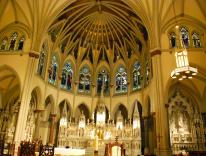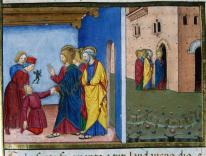Of the many painful details in reports on the capsizing of an overloaded refugee boat a half-mile off Lampedusa last week (the captain setting fire to a blanket to signal shore; the resulting panic of the passengers; the chaos that ensued as the Eritrean migrants—mainly women and children—were pitched into the water), maybe the hardest to bear is that the cries of the drowning were first mistaken for seagulls.
According to some reports, it was “local yachters” who first heard the sounds of the unfolding disaster, which if true provides not just apt symbolism but a literal picture of the divide between, in plain terms, those who have and those who do not. (The New Yorker pointed out that “if [before the accident] you searched the Web for ‘Lampedusa,’ you’d have found tourist sites touting a small Sicilian island with ‘the best bays and beaches.… Welcome to Paradise!’”). Divers were still searching for victims yesterday, with the toll passing three hundred and thirty, even as yet another vessel crowded with refugees capsized off Lampedusa, with twenty-seven dead at last count.
Pope Francis won justifiable attention during his visit to Lampedusa last July for use of the resonant “globalization of indifference” to characterize a dynamic that accommodates such tragedies and the underlying causes from which they arise. Lampedusa is the first destination for many Africans coming to Europe, lying just seventy miles across the Mediterranean from Tunisia. At the time of the pope’s visit, about fifty people in 2013 had died making the journey; that’s changed now, of course, with the total approaching 2012’s total of five hundred. World Bank economist Branko Milanovic estimates that since 1988, twenty thousand to twenty-five thousand people have died crossing from Africa to Europe, though he adds that no one really knows for sure. What’s behind the numbers, Milanovic says, is:
[a basic] issue to which there's no easy answer or easy solution, and that's the question of freedom of movement. We live in a world that is much more globalized, in which capital, knowledge, ideas and so on can travel much more easily. At the same time, it's a world in which people cannot move from country to country. … [It raises] an uncomfortable issue because all the other components of production are mobile, with the exception of one.
Milanovic does not view people merely as “components of production,” however, noting that “in an unequal world where income differences between countries are large, and information about these income differences is widespread, migration ... is simply a rational response to the large differences in the standard of living.” He also decries what he calls the “conspiracy of silence … that envelops” those who die in fleeing poor countries for richer ones. Though lightly clothed in the jargon of economics, his assessment doesn’t sound all that different from the construct Francis offered in July, at which time the pope also called the recurring deaths of migrants seeking better lives “a thorn in the heart.” Speaking after last week’s disaster, though, Francis employed more impassioned rhetoric to describe the migration crisis. “The word disgrace comes to me. It’s a disgrace!”


